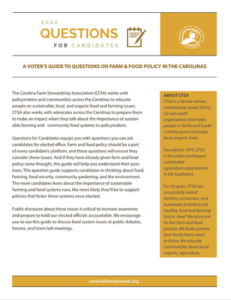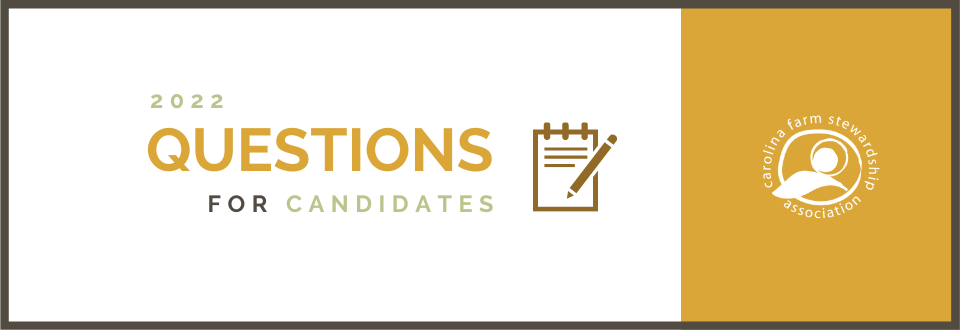A Voter’s Guide to Questions on Farm & Food Policy in the Carolinas
Carolina Farm Stewardship Association (CFSA) works directly with policymakers and community leaders across North and South Carolina to educate and collaborate on food and farming issues. Activists across the Carolinas make an impact when they voice the importance of sustainable farming and community food systems to policymakers.
 The 2022 Questions for Candidates equips you with questions you can ask candidates for elected office.
The 2022 Questions for Candidates equips you with questions you can ask candidates for elected office.
Farm and food policy should be a part of every candidate’s platform, no matter the level of public office, and these questions will make candidates think about these issues and help you understand their positions. We developed this guide to give candidates enough information to support them in thinking about and engaging in issues affecting food, farming, food security, community gardening, and the environment. The more candidates learn about the importance of sustainable farming and food systems now, the more likely they’ll be to support policies that foster these systems once elected.
What’s in the guide
Inside, you’ll find tips on how to build relationships with candidates and their staff, as well as 22 questions you can ask candidates running at each level of government:
- Local candidates: school board, city council, soil & water conservation district supervisor, or county commissioner positions
- State candidates in NC: NC House, NC Senate, governor, or other state-level positions
- State candidates in SC: SC House, SC Senate, governor, or other state-level positions
- Federal candidates: US House, US Senate, or president
How to use the guide
Public discourse about these issues is critical to increase awareness and hold our elected officials accountable. Please use this guide to discuss food system issues at public debates, forums, and town hall meetings.
CFSA puts out Questions for Candidates every election year with questions that pertain to the most pressing issues in North and South Carolina regarding local food and sustainable agriculture.
See previous editions:



